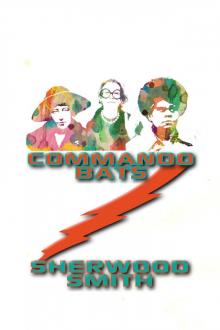- Home
- Sherwood Smith
The Thrones of Kronos Page 5
The Thrones of Kronos Read online
Page 5
“Immured here with your compute arrays and your technicians, who are all highly educated, you do not understand the lower ranks.” Barrodagh’s tone was pompous and dismissive.
Lysanter couldn’t resist evening things up a bit. “No, indeed, there your position gives you much greater expertise,” he said, earning a sharpened look.
“What do you know about Ogres?”
The question took Lysanter by surprise. “Ogres?”
“Barcan Ogres, the battle androids,” Barrodagh snapped.
“I know what they are, but I know very little about them. Never had reason to.” Lysanter ran a series of queries through his console. To his further surprise, there was a new chunk of data, quite large, tagged with Barcan origination.
Barrodagh smirked. “Barca has been quite cooperative since Hreem took them in hand. Can you verify the programming of an Ogre?”
Lysanter scanned the data. “I won’t know for sure until I dig into this, but in theory, yes.” He looked up. “You want them to defend the station when the Panarchists attack, don’t you?”
Barrodagh said, “Leave that to those whose concern it is. We have reason to question their programming. If you have any doubts at all, we must refuse them. You will have two to work on.”
“The Barcans are subtle, so I can’t guarantee to find everything, but I can certainly install guard programs to trigger disabling phages if the Ogres prove to be trapped.”
After fewer additional questions and requests for reports than Lysanter had expected, many involving the next series of tests, Barrodagh took his leave.
I should have promised him more clamp programming sooner. Lysanter leaned back in his chair, trying to relax. Barrodagh’s visits always disarranged his thinking; the man’s fear was contagious. He cast his mind back upon the career that had brought him here.
Had not Dol’jhar reached him first, he might now be a centripetal gnostor. He’d been almost ready to publish his first Synthesis, an intersection of Ontological Physics and Infonetics, when a mysterious visitor called on him, bearing a device constructed, or grown, of some material like nothing he’d ever seen before. It had taken years on the Suneater to confirm the suspicion on which he’d acted that day: that the Urian device the visitor brought was constructed according to some fantastically advanced evolution of his synthesis between the structure of fivespace and information theory.
Did he regret it? As always, there was no easy answer: he’d told himself that pure science had nothing to do with politics, and he would maintain a strict divide between the political intentions of his new masters and his own goals. He’d long ago forgotten the look of sunlight, the tang of natural air, the unplanned beauty of a planetary landscape. But in his research here he had seen behind the facade that Totality presented to the human mind, and now, if this Vi’ya recovered, he might at last uncover the last secret of the Ur, the overarching synthesis that would bring the station to full potential.
He sat upright again, rolled his head on his tense neck, and studied his console screen. It appeared that the Panarchists’ surveillance of the Suneater, long assumed but never detected, was now mutating into active harassment. Juvaszt was demanding more of the cims’ activity for military preparations. But it was Barrodagh who balanced Juvaszt’s demands against the compute-intensive cryptographic efforts that Barrodagh managed, those that controlled both their communications and the assault on Panarchist secrets in the DataNet. So Lysanter felt confident that with his new understanding with Barrodagh, he’d maintain command of the number of compute arrays he needed.
And then he’d be free to get back to the important work.
THREE
Vi’ya awoke and tasted salt. Salt water, tears? Irrelevant.
She waited for the gray mist to clear and the voices to resolve into sense.
Gradually she perceived that the gray was not fading away. She was staring up at a featureless gray ceiling.
“. . . weeping again.” It was Sedry’s voice.
Slowly memory returned, overlaid by her vision. The landing bay, Eusabian’s son Anaris, the convulsions of the Suneater.
Her lips parted gummily.
“Let me,” she heard Montrose say, and felt the sticky reluctance as he pulled something off the hollow of her throat. Hydration patch? How long had she been in the Dreamtime?
But she knew that was a senseless question. A part of her would always remain there, with Math, watching the steam-lashed wave towering over the Isle. And the Chorei were with her, in her.
Irritated by the direction her thoughts had taken, she tried to sit up, and succeeded as a pair of hands assisted her. She recognized the strength in the long, bony fingers: Jaim.
She looked up at his somber face, framed in the mourning braids of the Serapisti. His expression was largely blank, but she felt his relief and concern. She worked her rusty voice. “How long?”
“Almost three days,” he murmured.
“Three days of trying not to be digested by this hole.” Marim’s voice betrayed an undercurrent of anxiety, intensified by her emotional spectrum. Fear and anger were foremost.
Vi’ya winced at the discord. “They drugged me.”
Montrose said, “They shot us all—luckily with tranks, but not with anything from the standard pharmacopoeia.” He handed her a cup of water; she drank gratefully, feeling the tissues of her mouth and throat soak it up.
“Felt like bad Negus,” Lokri drawled, his tone of indifference clashing with the unease she felt from him. “But the rest of us came out of it in a few hours.”
Fear thrilled along her arms and back. She couldn’t sense the Eya’a.
Jaim must have been watching her closely. He said, “They’re in hibernation. Barrodagh wasn’t cooperative, but Sedry sweet-talked the other Bori into refrigeration for the Eya’a and their moss banks, and put them in the chamber next to us.” He pointed.
Vi’ya turned her head. The bed she sat on was nearest a puckered segment of wall. Slowly she scanned the round chamber, which was painted a uniform gray. A console sat against one wall, with beds on either side; Montrose and Sedry sat on those. Narrow beds lay unevenly along the perimeter, with storage units set up as partial screens. Another puckered depression led off behind Lokri’s bed—probably the fresher.
“We been waiting for you to wake up,” Ivard put in from the bed next to hers, his thin face eager. Lucifur, the beige and white cliff cat, lay next to Ivard, his ears twitching. “The Blessed Three said you and the Eya’a wandered far away, and not to disturb you.” Ivard laughed; Vi’ya caught a psychic flicker of the tripled blue radiance of the Kelly, a complex emotion composed of humor, awe, and others she had no referents for.
“What happened?” Jaim asked. She sensed his reluctance, his sense of duty, overlaid with the faintest echo of Brandon’s emotional spectrum. They learned from one another, it seems.
“What did you see?” She turned to Montrose, willing the heaviness away. Later she would clean the rest of the toxins out of her muscles by working through Ulanshu Kinesics with Jaim.
“You stopped moving. Stood rigid. Anaris swayed as if the gravs had failed. Neither of you appeared aware of your surroundings. The landing bay was shuddering like something in a grand mal seizure. When Anaris collapsed, Barrodagh shouted something and the Tarkans fired.”
Vi’ya felt the restraint in his words, but she didn’t need more than his bald recitation: the emotions of the crew filled in the rest of the story vividly. She felt grim satisfaction that Eusabian’s heir had collapsed while she remained standing.
“They haven’t told us anything of use,” Montrose finished.
“Lumpy little Bori that keeps narking us says null.” Marim frowned.
“His name is Morrighon, and he says what is needful.” Sedry pronounced the guttural with the precision of a gifted mimic new to a language, her tone a quiet warning.
Marim shrugged, her emotional spectrum spiking jarringly.
“And safe,”
Sedry added in a low voice.
Vi’ya wondered if the skews she sensed in everyone’s emotions were a residual effect of the tranquilizer drug. It seemed as though her crew members were becoming different people. Behind the immediate distortions, the aura of the station loomed, a dark seethe of invisible emotional energies. She wasn’t sure she wanted them to become clear. Not yet, anyway.
“How do you feel?” Montrose’s rumble conveyed urgency, the same pressure that was in all their minds.
She put her hands on the bed to either side of her and pushed to her feet. She felt strange—too tall. “Well enough to do what needs to be done. What are our hosts up to?”
“We’ve no way of finding out,” Montrose replied. “No boswells, and the console’s useless.”
“Anaris’s Bori secretary’s been in here every hour for the past eight or so.” Lokri’s mouth twitched in a half-smile. “Anaris is getting impatient, it appears.”
“Morrighon smells scared,” Ivard said. “Like he’s never not afraid.” He paused. “So did Barrodagh, in the landing bay.”
Vi’ya nodded. She had tried to prepare them in her briefings for the reality of Dol’jhar, but experience was the best teacher. Memory thrust its way past her mental guard: telling Markham they needed better plans, more drills, that Hreem was coming for them; Markham’s laughing assurance that that was just her Dol’jharian upbringing seeing vengeance seekers in every jacker they bested . . . Markham dying in jac-fire, with Hreem grinning behind the weapon.
Brandon Arkad’s sharp grief when she told him Markham was dead.
She shook her head violently and almost lost her balance. Once again, Jaim’s strong hand gripped her arm, steadying her.
Then something made a loud sucking noise and a puckered section of one wall dilated, admitting a short, misshapen Bori. Vi’ya winced. She didn’t need her tempathy to read him; indeed, as Ivard had said, the man reeked of exhausted fear.
She spoke first, to take the initiative away from him. “Is there not an annunciator?”
Morrighon merely looked at her. His reply—in Uni, not Dol’jharian—was measured, his speech devoid of emotional tone. “Privacy, as you must know, is a scarce commodity on Dol’jhar, and is a reward for service.”
She sensed no hostility in his mind. It was as Sedry had said. This Bori, with his stilted Uni, only said what was necessary. It made him all the more dangerous, for unlike his masters, he was subtle, as was evidenced in his choice of Uni, by which he let the whole crew hear what he said.
She caught a flicker of a look from Sedry, whose emotions revealed a guarded warmth and pity for the Bori. The noderunner was learning very fast how to serve a tempathic captain. Vi’ya decided to test Sedry’s opinion of Morrighon. “Perhaps if the Tarkans had been a little less trigger-happy, we’d be further along in our efforts,” she replied.
He hesitated, then said, “It may be so. If you are now able, the heir requires your attendance.”
You weren’t the one who gave the order to shoot, were you? she thought. If this was Anaris’s secretary, then there’d be no love lost between him and Barrodagh. That gave her more leverage.
Standing had cleared her head to a remarkable degree. All that remained of the tranks was a bone-deep ache and the slowing heaviness. “I am able, but I must see the Eya’a first.”
Morrighon dipped his head in a short nod. She turned toward the puckered depression near her bed and stepped around a pancake-like thing with a flat cable coming out of it; more snaked over the walls and ceiling. The cables all ran to a gray, rough-edged hole in the wall. There were no right angles in the room.
Vi’ya reached toward what she guessed was the door control, mounted on a dyplast scaffold around the pucker. When no one warned her away, she tabbed it, and a dart of energy lanced into a small hole above the door. She winced again as the pucker dilated with an unpleasant organic slurp.
A waft of frigid air bathed her face. Within the small, ovoid chamber the two small forms lay curled together in a nest of moss and their micro-filament weavings. Only now could she sense them. They were deeper into hibernation than she’d ever seen them. Fear pulsed: what if they didn’t—or couldn’t—come out of it?
Vi’ya shook her head firmly. Time enough to deal with that when, and if, it happened. Right now she faced an interview that would determine her degree of freedom, and that of her crew, on the Suneater.
She returned to Morrighon. “We will go now.”
Morrighon stopped Jaim with a gesture when he tried to follow. “The Lord Anaris summoned only your captain.” He smiled, a strangely painful expression. “I will return her to you as promptly as may be.”
Morrighon led Vi’ya through a maze of corridors, flattened ovoids in cross section, glowing red with the disconcerting, directionless illumination of Urian material. Marim’s comment about digestion was an apt one, she decided.
Morrighon was careful to point out the mind-blurs, currently set very low, at every nexus. “When your assistance is not required, they will be radiating at highest intensity.”
“You intend to confine me to my quarters, then?” The answer was obvious, but she was concentrating on the dark aura of the station, which pressed harder on her psyche as they proceeded. She was careful to show nothing of this. Although the direction of Morrighon’s gaze was hard to discern, she sensed how closely he was listening to her.
“It would be best. The Tarkans and grays will see you as one of the Chorei. You will find no companionship outside your crew.”
The reactions of the people they encountered had already demonstrated this convincingly. None of them met her eyes or stood in her pathway. The short Bori underlings appeared to ignore her, but she felt their unease, and the tall Dol’jharian ordinaries in their anonymous gray clothing reacted with stomach-twisting fear. Vi’ya saw no Tarkans.
“No other Rifters here?” Was this why Marim was so angry?
“None.” A flicker of avoidance in his thoughts, but now was not the time to probe it.
Then they reached a long, curving corridor without branchings, no one else in sight. Morrighon said, “We are almost to the Chamber of Kronos, to which the device you lost on Rifthaven has been returned.”
Vi’ya looked down at him. Why did he bring that up?
“This and Lysanter’s examination room are the only other parts of the Suneater you will see.” He stopped and faced her. “It is important you understand your position. Anaris and the Avatar have begun their duel for the succession. You, your crew, myself, this station, are but counters in it. You are only important to the heir if you can advance his interests. And do not think to ally yourself with his father. He is of the old beliefs. You are Chorei. It would not take much to make him order your death.”
Vi’ya pondered Morrighon’s surprising outburst. The emotions behind it hinted at a situation of even greater complexity than the words implied. He is dueling with Barrodagh. I had forgotten how, among Dol’jharians, place is not earned by merit so much as taken by strength.
To provoke further revelations, she said with heavy irony, “Then if I have a patron on this station, it is your master?”
Once again Morrighon gave that painful smile. “You well know you could not even ask that question in Dol’jharian. That should be answer enough.” He shook his head and began walking again. “But he is your only possible ally.”
Ally. An odd word to use under these circumstances. And he’d used it twice, implying that she had more power here than she knew. Very odd. Vi’ya could not imagine that Anaris would have directed Morrighon to reveal this and decided that Morrighon was even more dangerous than she had first assumed.
The tunnel ended in a broad surface with a large pucker in it. To either side stood Tarkans, a man and a woman. They were bigger than Vi’ya, but when their black eyes encountered hers, the impact of their fear was almost nauseating. They did not move as the door blurped open.
Vi’ya was surprised to see light in the chamber b
eyond, so heavy was the dark emanation of the Suneater. It pressed on her, accentuating her fatigue.
Her eyes at first refused to comprehend the room; it felt larger than it looked, a dichotomy that only intensified as she entered. A dyplast shield blocked direct entry, with ranks of instruments along it, from which heavy cable bundles ran out of the chamber through a gray-edged, ragged hole. She noticed imagers placed to cover every portion of the room.
In front of the instruments, his back to her, stood a slender man of middle height, with mouse-brown hair and bony shoulders under his lab coat. Barrodagh beside him; his eyes slid away from hers and lingered on Morrighon, evincing a wave of hatred and anxiety that radiated through the emotional veil of the station.
Vi’ya walked around the shield, toward the tall, powerfully built man she’d seen in dreams but only briefly in the waking world. He stood with his back to her, on a section of floor that seemed to reach out over nothingness—she could not see where the walls connected. To one side of Anaris, the floor humped up into a tall, complex mound, like a broad, stepped organic stalagmite.
It peaked in a semicircular lump, vaguely like a high seat. She could not see it, hidden as it was by the slightly raised back of the throne-like construct, but she sensed clearly the distinctive aura of the Heart of Kronos, here stained by the same darkness that pressed on her mind. She reached out experimentally, sensing a reassuring flicker of the Kelly and a pulse of trust and respect from Ivard. Nothing from the Eya’a.

 Inda
Inda Danse De La Folie
Danse De La Folie King's Shield
King's Shield Whispered Magics
Whispered Magics Fleeing Peace
Fleeing Peace Barefoot Pirate
Barefoot Pirate Crown Duel
Crown Duel Mearsies Heili Bounces Back
Mearsies Heili Bounces Back Commando Bats
Commando Bats A Stranger to Command
A Stranger to Command Lhind the Spy
Lhind the Spy The Spy Princess
The Spy Princess Blood Spirits
Blood Spirits Sasharia en Garde
Sasharia en Garde Lhind the Thief
Lhind the Thief Paradise Drift
Paradise Drift Banner of the Damned
Banner of the Damned The Trouble With Kings
The Trouble With Kings Poor World
Poor World Treason's Shore
Treason's Shore Wren Journeymage
Wren Journeymage A Posse of Princesses
A Posse of Princesses Revenant Eve
Revenant Eve Once a Princess
Once a Princess Time of Daughters I
Time of Daughters I Rondo Allegro
Rondo Allegro Coronets and Steel
Coronets and Steel Over the Sea
Over the Sea Senrid
Senrid Hunt Across Worlds
Hunt Across Worlds A Sword Named Truth
A Sword Named Truth The Fox
The Fox Twice a Prince
Twice a Prince Fair Winds and Homeward Sail: Sophy Croft's Story
Fair Winds and Homeward Sail: Sophy Croft's Story Time of Daughters II
Time of Daughters II The Rifter's Covenant
The Rifter's Covenant The Phoenix in Flight
The Phoenix in Flight Stranger
Stranger The Thrones of Kronos
The Thrones of Kronos A Prison Unsought
A Prison Unsought Twice a Prince: Sasharia En Garde Book 2
Twice a Prince: Sasharia En Garde Book 2